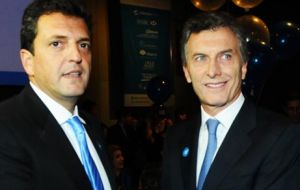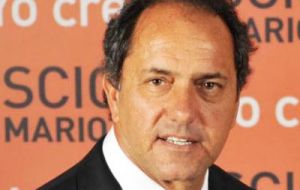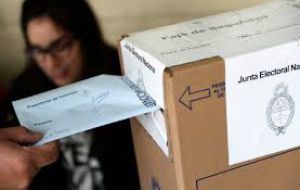MercoPress. South Atlantic News Agency
Argentine opposition agree on reform but not on an electoral alliance
 Sergio Massa ruled out the possibility of establishing a broader alliance ahead of October’s elections with Buenos Aires City mayor Mauricio Macri.
Sergio Massa ruled out the possibility of establishing a broader alliance ahead of October’s elections with Buenos Aires City mayor Mauricio Macri.  With Scioli taking 38.4% of the vote, he is not far from reaching the conditions that would give him the presidency without the need to head to a runoff
With Scioli taking 38.4% of the vote, he is not far from reaching the conditions that would give him the presidency without the need to head to a runoff  Recalling the results of the August 9 primaries the matter of how precisely the opposition cooperates, or not, has become a matter of capital importance
Recalling the results of the August 9 primaries the matter of how precisely the opposition cooperates, or not, has become a matter of capital importance Argentine opposition presidential candidates despite the encouraging mathematics which emerged from early August primaries, and despite having sat at the same table to call for electoral reform, insisted that any ongoing cooperation between the two rival candidates on electoral matters should not be confused with an electoral alliance.
In statements to Mitre radio station, the head of the Renewal Front and third in ballots, Sergio Massa ruled out the possibility of establishing a broader alliance ahead of October’s elections with the candidate of the centre-right Let’s Change (Cambiemos) coalition, and Buenos Aires City mayor Mauricio Macri.
“That does not mean another type of agreement but that we have the maturity to agree on a matter in order to take care of the citizenship,” Massa said as he called other presidential candidates to join efforts to improve the voting system that has sparked a fierce controversy this week following the violent events during Sunday’s elections in the province of Tucumán.
“Other candidates have to be called as well,” he said. “We have to agree on state policies with everyone, (Daniel) Scioli must be invited, Macri, (Adolfo) Rodríguez Saá, (Margarita) Stolbizer, (Nicolás) del Caño and have us sit at a table.”
On Friday, Macri made a point of noting that he was part of a broad effort seeking change in the electoral system that did not include the government, whom he accused of not being interested in reform.
“We assumed a commitment with (Sergio) Massa, (Margarita) Stolbizer and (Ernesto) Sanz that in 2017 we will vote with the best system possible, the most transparent and simplest for the people. Furthermore, we want to sit down at a table to simplify the schedule, we can’t live in elections all the time. Let’s unify all the elections that take place during the year. It is a waste of time and very expensive. We have to think about making a much simpler electoral system,” the head of the PRO party said.
Bearing in mind the results of the August 9 primaries and the run up to the October 25 elections, the matter of how precisely the opposition cooperates — or not — has become a matter of capital importance, especially if there is a need to head to a runoff in November.
With Daniel Scioli of the Victory Front (FpV) taking 38.4% of the total vote, he is not far from reaching the conditions that would give him the presidency without the need to head to a runoff — collecting 45% of the total vote or a 10 point difference with at least 40% of the vote. If that is not achieved a runoff is required to settle who will be succeeding President Cristina Fernández. Macri is all but assured to be Scioli’s rival in the decisive phase.
Macri, however, will need to convince voters who voted for Massa in the primaries and in the general election to go for his ballot in the runoff to have any chance of victory. As such, the photo-op earlier this week at a downtown hotel in which Macri, Massa and Stolbizer sent a united message on electoral reform is sure to re-surface if a runoff is necessary.
However Massa draws his support from voters who traditionally vote for the Justicialist Party (PJ), many of whom have expressed a distrust both of the Kirchnerite administration as well as the PRO, Macri’s party. This week, the non-PJ opposition has sent thinly-veiled messages suggesting that the irregularities in the voting system can be pinned on the PJ. Massa bristled at this suggestion at Wednesday’s press conference, pointing out that the fraudulent and “feudal” provincial governments in Santiago del Estero were not Justicialista but rather “belonged to another party.”
Always keen on driving a wedge between his rivals, Argentine Cabinet Chief Aníbal Fernández goaded Massa on Friday, chastising him for “giving up the possibility of his candidacy, ceding it to Macri because all of them have gone to trail Macri.”
Fernández tried to portray the election as more of a contest between Peronism and non-Peronism and hinting that a deal between Macri and Massa would be “against nature and doesn’t make any sense.”




Top Comments
Disclaimer & comment rules-

-

-

Read all commentsDoes anybody care?
Aug 31st, 2015 - 11:12 am 0No, I thought not.
Pathetic opposition, they can´t agree on some basic points to set a common front against the kirchnerite mafia.
Aug 31st, 2015 - 11:34 am 0This country is so doomed.
So basically it's more of the same.
Aug 31st, 2015 - 12:14 pm 0Oh well.....Vote Early ....Vote Often.
Commenting for this story is now closed.
If you have a Facebook account, become a fan and comment on our Facebook Page!